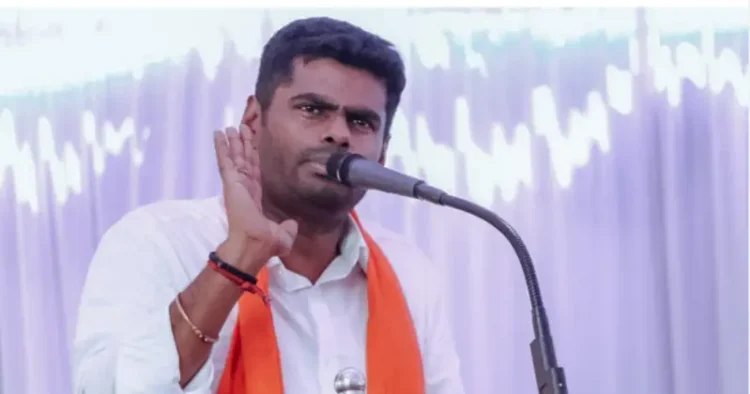Tamil Nadu BJP Chief, K Annamalai, is facing legal repercussions as the TN police have recently filed a case against him. The charges are related to an alleged attempt to disturb public peace. The incident unfolded during a heated altercation between Annamalai and DMK cadres, where he purportedly entered a church premises and garlanded the Mary figurine.
Dharmapuri police have registered a case against Tamil Nadu BJP Chief, K Annamalai, under three sections of the IPC, accusing him of promoting religious enmity, provoking public peace, and fostering ill-will between classes of people within a place of worship. The case stems from an incident during Annamalai’s ‘En Mann En Makkal’ padayatra in Dharmapuri district.
In January, during his padayatra, Annamalai’s convoy halted near a church, where he accepted the reception from BJP cadres. Subsequently, Annamalai and local functionaries expressed a desire to pray at a roadside church. However, the situation took an unpleasant turn as certain individuals, allegedly DMK cadres, objected to Annamalai entering the church.
The confrontation escalated with accusations and counter-arguments. The protesters reportedly brought up the Manipur violence issue, accusing Annamalai and BJP of being responsible for the killing of Christians. Annamalai, a former IPS officer, attempted to clarify the situation, explaining that the Manipur incident was a clash between two communities following a directive from the High Court to grant Scheduled Tribe status to the Meitei community.
Despite Annamalai’s efforts to defuse the situation, the protestors persisted in their objections, alleging that the BJP is anti-Christian. Annamalai urged them not to behave like DMK party members and tried to reason with them. Realising that further debate would be futile, he posed a hypothetical scenario, asking what the protestors would do if over 10,000 BJP cadres came to pray at the church. Annamalai proceeded to enter the church, garland the small statue of Mary, and offer his prayers.
According to BJP leaders, this incident was a pre-planned effort by DMK to create chaos and paint the BJP as anti-Christian. The party alleges that DMK orchestrated the disturbance to shape a narrative portraying the BJP negatively and discouraging support from the Christian community.

Video footage reveals police officials intervening and removing the troublemakers before Annamalai could complete his prayers. In one clip, a police officer is seen speaking into the ear of one of the protestors, raising suspicions of coordination. BJP functionary Omampuliyur Jayaraman suggested that DMK, faced with the success of Annamalai’s yatra, is attempting to undermine it through orchestrated acts.
Annamalai’s yatra has garnered significant support across various communities, including minorities, with people welcoming him at various locations. However, the incident near the church has added a political dimension to the ongoing narratives between the DMK and BJP in Tamil Nadu.
The charges stem from an altercation between Annamalai and a group of Christian youths during his rally, ‘En Mann En Makkal,’ outside St. Lourdes Church in Bommidi on January 7. The BJP leader’s attempt to enter the church and garland the statue of Mary resulted in objections from the gathered Christian youth, leading to a heated confrontation.
The police have filed cases against Annamalai under three sections of the IPC, including attempting to disturb public tranquility. The complaint alleges that Annamalai’s actions were an attempt to create communal clashes between Hindus and Christians. The incident unfolded during Annamalai’s ongoing padayatra, a political rally where he interacts with the public.
Omampuliyur Jayaraman, a BJP functionary, has accused the DMK of employing double standards in this case. He highlighted the irony of the DMK accusing Hindus of discrimination while simultaneously filing cases against BJP leaders for entering churches. Jayaraman argued that the DMK’s alleged double standard is evident in its rhetoric of promoting a casteless society while seeking caste-wise census benefits for electoral gains.
The BJP functionary further criticised the DMK and AIADMK governments for allegedly favouring minorities through fund allocations for the renovation of their places of worship, cash assistance to religious leaders, and subsidies for two-wheelers. He expressed concern about the government’s control over Hindu temples and the diversion of temple revenue for non-religious purposes, leading to the poor upkeep of temples and meagre salaries for pandits of the temple.
Jayaraman accused the DMK of instigating trouble through atheist groups and disgruntled individuals to create unrest around Hindu temples. He claimed that the government spreads misinformation about temples like the Chidambaram Thillai Nataraja temple to target their revenue. The BJP functionary also accused the DMK of selectively distributing Pongal hampers and denying them to several lakhs of ration cardholders.
Highlighting the alleged biased conduct of the police, Jayaraman criticised them for selectively arresting individuals opposed to the DMK and its allies, as well as minorities, without proper complaints. He claimed that the police closely monitor social media platforms to arrest individuals critical of the DMK during midnight, treating them like terrorists and invoking the Goondas Act.
The BJP functionary raised concerns about the police’s failure to act against DMK leaders, platform speakers, MPs, MLAs, leaders of allies, and Christian clerics, and Muslim leaders for their alleged hate speech. He accused them of issuing threats to top BJP leaders and questioned their impartiality in handling cases related to communal tensions.
Critics argue that the church incident involving Annamalai reflects the delicate intersection of religion and politics in Tamil Nadu. The ongoing narratives between the DMK and BJP are further fueled by accusations of selective targeting, biased policing, and attempts to manipulate public opinion.
As legal proceedings unfold, the incident has intensified the political discourse in the state, with both major parties vying for support across diverse communities. The nuanced dynamics of religious affiliations and political motivations continue to shape the unfolding events in Tamil Nadu.




















Comments